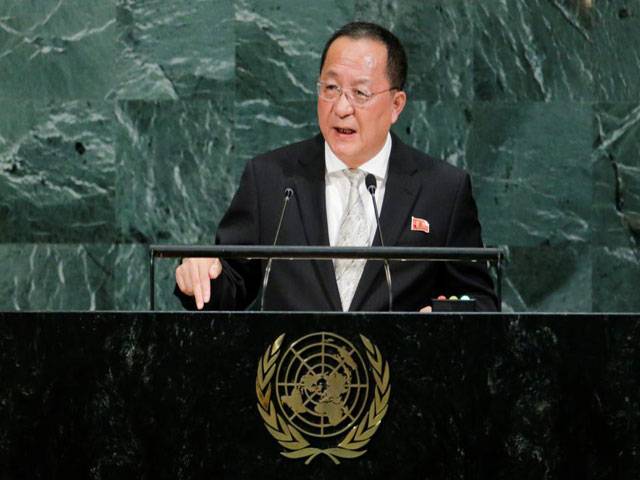NEW YORK - North Korea's foreign minister accused US President Donald Trump on Monday of declaring war on his country and warned that Pyongyang would defend itself by shooting down US bombers.
"Trump claimed our leadership would not be around much longer," North Korean Foreign Minister Ri Yong-ho told reporters outside his hotel in New York. "He declared a war on our country."
"All the member states and the whole world should clearly remember it was the United States that first declared war on our country," Ri said.
"Since the United States declared war on our country, we will have every right to take counter-measures including the right to shoot down US strategic bombers even when they are not yet inside the airspace border of our country," he said.
"The question of who won't be around much longer will be answered then."
In his first address to the General Assembly, Trump last week threatened to "totally destroy" North Korea if it challenged America or its allies and derided leader Kim Jong-un as a "rocket man" who was "on a suicide mission."
Ri noted that the statement from Trump was "clearly a declaration of war" even if it came from the US president. Under the US Constitution, Congress is the sole power that can declare war.
In his brief address to reporters before heading to the airport, Ri said that the international community had hoped that the "war of words between the DPRK and the United States not turn into real actions."
White House rejects claim
The White House on Monday rejected claims that the United States has declared war on North Korea as “absurd” in the latest exchange of barbs and insults between the two nuclear powers.
“We have not declared war on North Korea and frankly the suggestion of that is absurd’” said White House press secretary Sarah Huckabee Sanders.
Sanders also took issue with the suggestion that Pyongyang would have the right to shoot down US planes near North Korean airspace. “It’s never appropriate for a country to shoot down another country’s aircraft when it’s over international waters,” she said.
The North Korean nuclear crisis has dominated this year's gathering of world leaders at the United Nations, which wraps up on Monday, amid fears that the heated rhetoric could accidentally trigger a war. North Korea in recent weeks detonated its sixth nuclear bomb and has test-fired intercontinental missiles - saying it needs to defend itself against hostility from the United States and its allies. During his address to the General Assembly on Saturday, Ri launched a personal attack on Trump, calling him a "mentally deranged person full of megalomania."
Just hours before Ri took the UN podium, US bombers flew off the east coast of North Korea, the furthest north of the demilitarized zone that any US aircraft has flown this century.
The Pentagon said the mission was a "demonstration of US resolve and a clear message that the president has many military options to defeat any threat." Trump's threat to destroy North Korea made "our rockets' visit to the entire US mainland all the more inevitable," Ri said on Saturday.
Iran says Trump claims of North Korea links 'nonsense' Iran said Monday that suggestions by US President Donald Trump that it was working with North Korea on missile development were "nonsense".
Foreign ministry spokesman Bahram Ghasemi was responding to a tweet by Trump over the weekend in which the US president wrote: "Iran just test-fired a Ballistic Missile capable of reaching Israel. They are also working with North Korea."
Ghasemi said there were "no similarities nor resemblance" with the actions of North Korea, and that claims they were working together on ballistic missile development amounted to a "clear lie".
"It is very clear that this is a nonsense and baseless claim," he told reporters.
Iran said on Saturday that it had tested its Khorramshahr missile with a range of 2,000 kilometres (1,250 miles). The indigenously-built Khorramshahr was first announced by the defence ministry in September 2016, and US officials said it was this ballistic missile was tested in January, sparking international condemnation.
However, Iran never confirmed that the January test was the Khorramshahr missile.
There has been speculation, particularly from hawks in Washington, that the Khorramshahr was based on North Korea's intermediate-range Musudan missile. In 2010, a diplomatic cable released by Wikileaks showed that US intelligence officers believed North Korea had shipped Musudan missiles to Iran. But analysts say the differing ranges cast doubt on those concerns.
A detailed report earlier this year by the US-Korea Institute at John Hopkins University in the United States found: "The available evidence cannot verify speculation that the Iranian missile is similar to North Korea's Musudan".
Iran and North Korea have cooperated on military technology in the past.
During Iran's war with Iraq in the 1980s, it turned to North Korea as one of the only sources of military assistance, importing a stockpile of Nodong missiles.
Iran used the Nodong to develop its own medium-range Shahab-3 missile, first tested in 1998, and it has continued to improve on the design since.
But there has been scant evidence of direct cooperation between the two countries in recent years, with Iran seemingly keen to distance itself from the East Asian pariah state.
Instead, Iran has emphasised its home-grown missile programme, and denied that this breaches any international laws.
"Since the criticism of American officials, the speed of missile development has increased several times," said General Amir Ali Hadjizadeh, head of aerospace forces for the Iran's elite Revolutionary Guards, according to state television on Monday.
"All the materiel and pieces for our missiles are manufactured locally and do not come from abroad," he said.
He said the Khorramshahr missile was 13 metres (43 feet) long and could carry an 1,800 kilogram (almost 4,000-pound) payload.






